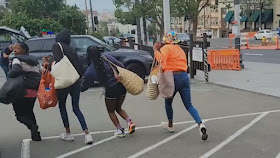A number of U.S. industry associations have sounded the alarm that retail theft continues to increase despite their efforts to strengthen loss prevention and enhance employee security.
David Johnston, an executive with the National Retail Federation, the world’s leading trade organization, claims that inventory losses due to retail theft skyrocketed to $100 billion in 2022, adding that this number is projected to rise further.
“There have been employees and customers injured,” he says in a new interview with Fox Business. “There have been employees killed while these shoplifting events are taking place,” he added.
Jan Kniffen, CEO of retail research firm J Rogers Kniffen, told Seeking Alpha that social acceptance and reduced penalties for offenders are major factors driving the increase.
I would contend that social pressure has fallen to modern day lows. There is no embarrassment when people around you find out you aren’t paying your bills or that you are stealing goods from a store. So, the bad news is that shrink is now normalizing across the country, especially in cities.
She continued: “The legal penalties for theft have the likelihood of apprehension have fallen dramatically. This is a societal problem that really accelerated during the pandemic. But, it isn’t going away.”
Executives from Foot Locker, Kohl’s, Walmart, and Target, which is currently facing a backlash over its launch of an LGBT childrens clothing range, have also voiced their concerns over the financial damages they’ve incurred due to theft.
“I would just say that again [theft] has been a multi-year dynamic industry, we are not immune to it, it’s increasing. You’ve heard Target talk about it and others, and so it’s having an increased impact on Foot Locker,” Foot Locker CEO Mary Dillon said last week, according to Fox Business.
“We’ve seen a significant increase in theft from stores and usually through this lens of an organized retail crime type of action, affecting more apparel certainly than footwear, where we only have one item out, but apparel is affected,” she continued.
Target CEO Brian Cornell also said in a call with investors this week that the issue is having a major impact on the company, shaving off approximately $1.2 billion in profits this year alone:
Beyond macroeconomic challenges, we continue to contend with significant headwinds caused by inventory shrink, building on a worsening trend that emerged last year. While shrink can be driven by multiple factors, theft and organized retail crime are increasingly urgent issues, impacting the team, and our guests and other retailers.
The problem affects all of us, limiting product availability, creating a less convenient shopping experience, and putting our team and guests in harm’s way. The unfortunate fact is, violent incidents are increasing at our stores and across the entire retail industry. And when products are stolen, simply put, they’re no longer available for guests who depend on them. And left unchecked, theft, and organized retail crime to grade the communities we call home.
Meanwhile Walmart CEO John Furner has also admitted it is becoming “really challenging” for the company—and the industry as a whole:
We’re going to continue to take the steps that are reasonable and required to make sure we’re protecting our customers, protecting our associates, and protecting our assets and inventor.
It will take communities stepping up and enforcing the law to be able to bring this issue back under control.
A lot of the retail theft takes place in major, Democrat-controlled cities such as San Francisco, New York, and Chicago. Many companies such as Walgreens and Whole Foods have been forced to close stores as a result.
Despite some arguing that it is a way of balancing the economic scales, and that many offenders cannot afford necessities as a result of the rampant inflation, shoplifting ultimately has a detrimental effect on society. Some of the most serious consequences include increased prices for other consumers, job losses, and a negative impact on economic growth across the country.

